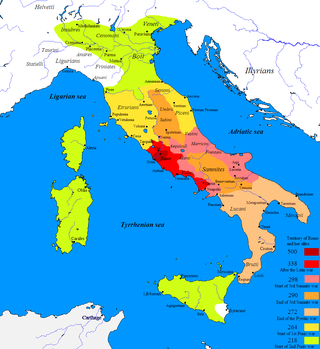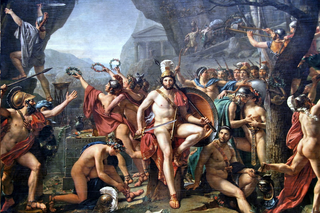Related Research Articles
This article concerns the period 269 BC – 260 BC.
Year 265 BC was a year of the pre-Julian Roman calendar. At the time it was known as the Year of the Consulship of Gurges and Vitulus. The denomination 265 BC for this year has been used since the early medieval period, when the Anno Domini calendar era became the prevalent method in Europe for naming years.

Year 272 BC was a year of the pre-Julian Roman calendar. At the time it was known as the Year of the Consulship of Cursor and Maximus. The denomination 272 BC for this year has been used since the early medieval period, when the Anno Domini calendar era became the prevalent method in Europe for naming years.

Agis IV, the elder son of Eudamidas II, was the 25th king of the Eurypontid dynasty of Sparta. Posterity has reckoned him an idealistic but impractical monarch.
Cleomenes II was king of Sparta from 370 to 309 BC. He was the second son of Cleombrotus I, and grandfather of Areus I, who succeeded him. Although he reigned for more than 60 years, his life is completely unknown, apart from a victory at the Pythian Games in 336 BC. Several theories have been suggested by modern historians to explain such inactivity, but none has gained consensus.

Areus I was Agiad King of Sparta from 309 to 265 BC. His reign is noted for his attempts to transform Sparta into a Hellenistic kingdom and to recover its former pre-eminence in Greece, notably against the kings Antigonos Gonatas of Macedonia and Pyrrhus of Epirus.
Areus II was Agiad King of Sparta from 262 to 254 BC. He never reigned as he was still a child when he died. He was succeeded by his cousin Leonidas II, who had served as regent.
Ptolemy, king of Epirus was the second son of Alexander II, king of Epirus, and Olympias, grandson of the great Pyrrhus and brother of Phthia of Macedon. He was named in honour of his late uncle Ptolemy. He succeeded to the throne on the death of his elder brother, Pyrrhus II of Epirus, but reigned only a very short time, having set out on a military expedition, during the course of which he fell sick and died or, according to Polyaenus, he was treasonably assassinated. The date of his reign cannot be fixed with certainty, but as he was a contemporary of Demetrius II, king of Macedonia, it may be placed between 239 and 229 BC. He was succeeded by Deidamia II or Pyrrhus III.
Phylarchus was a Greek historical writer whose works have been lost, but not before having been considerably used by other historians whose works have survived.
Chilonis was a Spartan princess, daughter of Leotychidas, wife of Cleonymus, then Acrotatus, with whom she had Areus II. She is known from Plutarch's "Life of Pyrrhus".
Archidamus IV was Eurypontid king of Sparta from c. 300 BC to c. 275 BC. An obscure king, Archidamus is only known for his defeat against the Macedonian king Demetrius Poliorketes at Mantinea in 294, where he might have also died since nothing is heard of him afterwards. This defeat marks the beginning of a long eclipse for the Eurypontid kings, who are not mentioned again until the emergence of Agis IV 50 years later.
Areus may refer to:
Alcetas II, king of Epirus, was the son of Arybbas, and grandson of Alcetas I. On account of his ungovernable temper, he was banished by his father, who appointed his younger son, Aeacides, to succeed him. On the death of Aeacides, who was killed in a battle fighting against Cassander in 313 BC, the Epirotes recalled Alcetas. Cassander sent an army against him under the command of Lyciscus, but in 312 BC entered into an alliance with him. The Epirotes, incensed at the outrages of Alcetas, rose against him and put him to death, together with his two sons. As a result, in 306 BC Pyrrhus, the son of Aeacides, was placed upon the throne by his protector King Glaukias of the Illyrians.
Acrotatus was the son of Cleomenes II, king of Sparta. He incurred the displeasure of an influential group of Spartan citizens by opposing the decree which was to release from infamy all who had fled from the battle in which Antipater defeated Agis in 331 BC. He was thus glad to accept the offer from the Agrigentines who had asked Sparta for assistance in 314 BC against Agathocles of Syracuse.

The Agiad dynasty was one of the two royal families of the Ancient Greek city-state of Sparta. They ruled jointly along with the Eurypontid dynasty, possibly from the 8th century BC onwards, being the senior of the two houses. The hypothetical founder of the dynasty was Agis I, possibly the first king of Sparta at the end of the 10th century BC, who subsequently gave his name to the dynasty. The two lines, who maintained an enduring rivalry, were, according to tradition, respectively descended from the twins Eurysthenes and Procles, both descendants of Heracles. The most famous member of the Agiad dynasty was Leonidas I, known for his heroic death at the Battle of Thermopylae in 480 BC. The last Agiad king was Agesipolis III, deposed by the Eurypontid Lycurgus in 215 BC.

The siege of Sparta took place in 272 BC and was a battle fought between Epirus, led by King Pyrrhus, and an alliance consisting of Sparta, under the command of King Areus I and his heir Acrotatus, and Macedon. The battle was fought at Sparta and ended in a Spartan-Macedonian victory.
Cleonymus was a member of the Spartan royal family of the Agiad dynasty.
Aristodemus was a tyrant of the Greek city of Megalopolis. He was a Phigalian by birth and a son of Artylas, who had been adopted by Tritaeus, an influential citizen of Megalopolis.

Pyrrhus' invasion of the Peloponnese in 272 BC was an invasion of south Greece by Pyrrhus, King of Epirus. He was opposed by Macedon and a coalition of Greek city-states (poleis), most notably Sparta. The war ended in a joint victory by Macedonia and Sparta.
The Battle of Argos of 272 BC was fought between the forces of Pyrrhus, the king of Epirus, and a spontaneous alliance between the city state of Argos, the Spartan king Areus I and the Macedonian king Antigonus Gonatas. The battle ended with the death of Pyrrhus and the surrender of his army.
References
 This article incorporates text from a publication now in the public domain : Smith, William, ed. (1870). "Acrotatus (2)". Dictionary of Greek and Roman Biography and Mythology .
This article incorporates text from a publication now in the public domain : Smith, William, ed. (1870). "Acrotatus (2)". Dictionary of Greek and Roman Biography and Mythology .
